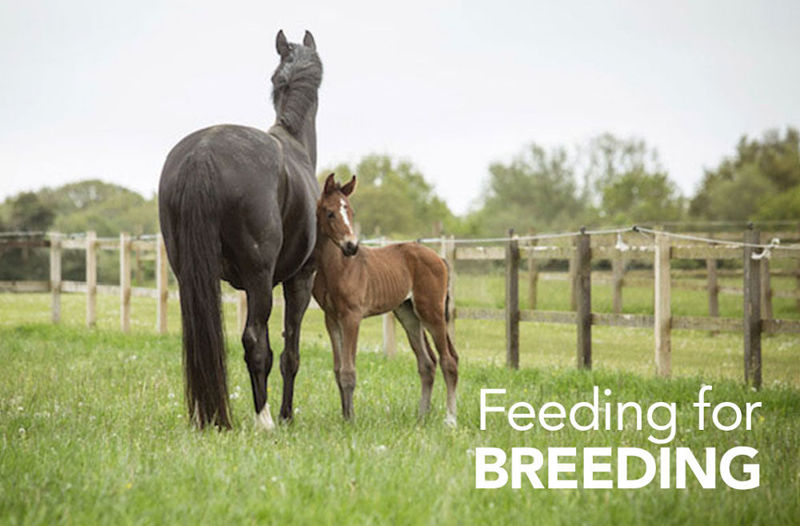Getting your horse into optimal condition to help with successful breeding also includes looking at their nutrition and diet carefully.
For all breeding stock, their nutrient requirements will change throughout the breeding season and will also differ between Mares and Stallions. Body condition scoring of both the Mare and Stallion is essential as being underweight or overweight can greatly affect fertility levels. Being overweight can also put unnecessary strain on the joints and cause complications during the birth process as well as increasing the risk of laminitis.
Stallions
For the stallion there are two main categories that cover their nutritional requirements - maintenance and breeding. Stallions that are used for breeding purposes have a similar energy requirement to high level performance horses during the breeding season. It is therefore important to ensure that they are getting a suitable nutrient and calorie intake to maintain weight and condition as well as sperm health and quality. When stallions are not actively breeding or if they are only breeding occasionally, their nutritional requirements will be similar to maintenance so less changes will be necessary. In these cases, consider calorie intake very carefully whilst still ensuring that the right balance of vitamins and minerals is provided.
Mares
Mares have three stages during breeding - maintenance, pregnancy and post-natal. Mares require the correct nutrients to not only be healthy themselves but to ensure they are providing their foal with the best nutrition as well. During the first two trimesters the nutritional requirements of the maiden mare or one without a foal at foot do not greatly change from maintenance requirements. From eight months onwards the foetus grows rapidly and meeting nutritional requirements is essential as the foal requires certain vitamins and minerals that they will store for use once they are born as these are not provided in the mare’s milk. Once the foal is born, the mare’s energy requirements are likely to increase to accommodate feeding the foal so you may need to add additional calories to the diet as well as ensuring that the correct balance of vitamins and minerals is still being provided.
Essential Nutrients
Nutrients that are important to all breeding stock include:
Protein – a major constituent of all body tissues including muscle, bone, skin and organs.
Vitamins and Minerals – Zinc and Copper are essential minerals for breeding and growing horses. Vitamins such as vitamin E and C are powerful antioxidants which assist in reproductive health and fertility. Vitamin A is also an essential vitamin for fertility and reproductive activity.
Omega-3 Fatty Acids – these have been shown to have a positive influence on reproductive success and as horses cannot manufacture these on their own, the diet needs to provide the main source.
Mare & Youngstock™ provides nutrients tailored to the increased requirements of mares in the last three months of pregnancy and throughout lactation, and for youngstock from weaning until they are 18 months old (NRC, 2007).
In many cases there are distinct advantages to feeding a nutrient dense supplement rather than traditional stud feeds, the most obvious being helping good doers to maintain a healthy weight during pregnancy, which can help to ensure a healthy birth and avoid excessive joint strain in mares and foals.
About Mare & Youngstock™
Mare & Youngstock™ provides 24 essential vitamins and minerals in quantities that meet the recommended NRC (2007) requirements of breeding stock when fed a pasture and forage-based diet.
Copper, Zinc and Manganese are included in chelated form to enhance mineral absorption and reduce negative interactions with other nutrients. Lysine, the first limiting amino acid, is also supplied to ensure optimum utilisation of the quality protein in Soya meal. The probiotic live yeast, Yea-Sacc®, is also included which is beneficial for young horses who often need support to build up a healthy population of microflora in the hindgut, as well as helping to ensure efficient digestion in mares. Mint and Peppermint powder are added as digestive tract soothers, and also to help stimulate appetite, which is especially useful when mares are near the end of their pregnancy. Rosehips provide joint support and antioxidants that help to neutralise free radicals.
📷 Zoe Kirkpatrick / Heartbreaker Stud


